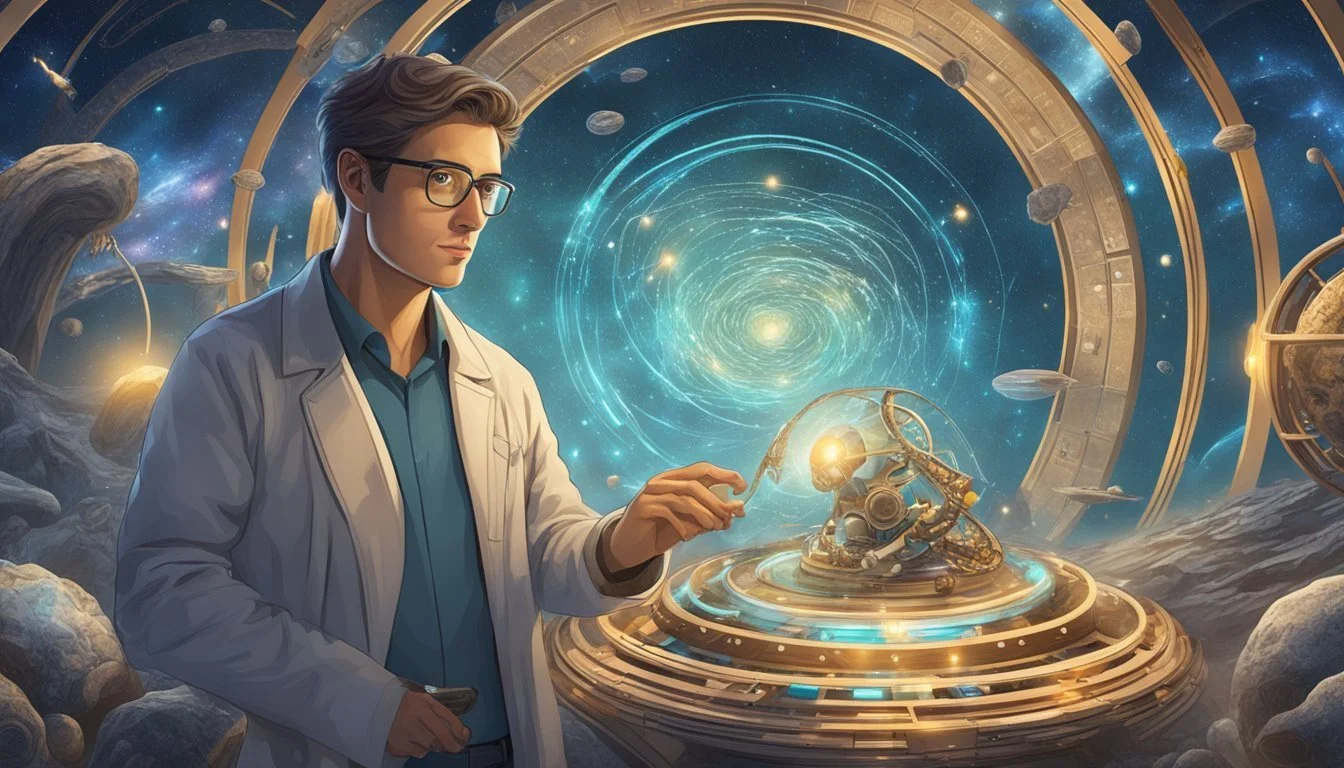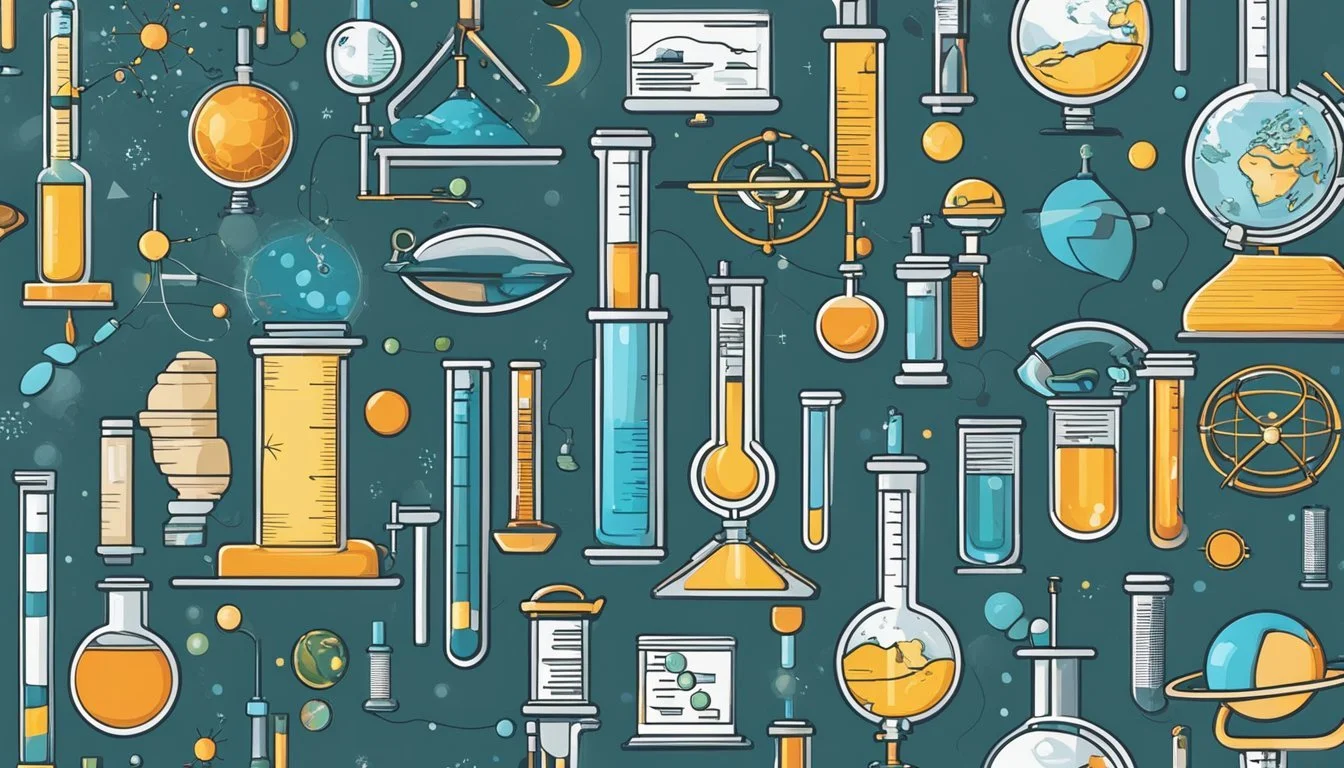11 Documentaries About the Most Controversial Scientific Theories
Examining Debated Ideas in Modern Science
Scientific documentaries offer a captivating window into the world of groundbreaking theories and discoveries. These films explore controversial ideas that challenge established knowledge and spark intense debates within the scientific community.
Documentaries about controversial scientific theories provide viewers with an accessible way to engage with complex concepts and understand the ongoing pursuit of knowledge. They showcase the work of researchers pushing the boundaries of understanding, often featuring competing viewpoints and highlighting the rigorous process of scientific inquiry. By presenting these contentious ideas, such documentaries stimulate critical thinking and encourage audiences to consider alternative perspectives on our world and universe.
1) An Inconvenient Truth
An Inconvenient Truth is a 2006 documentary film directed by Davis Guggenheim. The film features former U.S. Vice President Al Gore presenting a comprehensive slide show about global warming.
Gore's presentation covers the scientific evidence for climate change and its potential impacts on the planet. He discusses rising temperatures, melting glaciers, and extreme weather events as indicators of global warming.
The documentary gained significant attention upon release, raising public awareness about climate change. It won two Academy Awards and grossed over $50 million worldwide.
Critics praised the film for its effective communication of complex scientific concepts. Some scientists, however, questioned the accuracy of certain claims made in the documentary.
An Inconvenient Truth sparked debate about the urgency of addressing climate change. It influenced public policy discussions and inspired many viewers to take action on environmental issues.
The film's impact extended beyond its initial release, contributing to ongoing conversations about climate science and environmental responsibility.
Wikipedia: An Inconvenient Truth
2) Food, Inc.
Food, Inc. explores the industrial production of meat, grains, and vegetables in the United States. The documentary examines how large corporations control the food supply chain.
The film reveals the hidden costs of the current food system, including environmental damage and health risks. It shows how factory farming practices prioritize profit over animal welfare and food safety.
Food, Inc. features interviews with farmers, industry insiders, and food safety advocates. It investigates topics like the widespread use of corn in processed foods and the prevalence of GMOs.
The documentary sparked debates about food labeling, sustainable agriculture, and consumer choices. It encouraged viewers to consider the origins of their food and support local, organic options.
Food, Inc. received critical acclaim and several award nominations. Its impact extended beyond the screen, influencing public discourse on food policy and nutrition.
3) The Magic Pill
The Magic Pill is a 2017 documentary that explores the potential health benefits of a high-fat, low-carbohydrate diet. Narrated and produced by celebrity chef Pete Evans, the film follows individuals with various chronic illnesses who adopt a ketogenic or paleo-style eating plan.
The documentary claims that embracing fat as a primary fuel source can lead to significant improvements in health conditions. It features stories of people reportedly experiencing positive changes in ailments such as autism, cancer, and diabetes after altering their diets.
The Magic Pill has sparked controversy in the medical community. Critics argue that some of its health claims lack scientific backing and may be misleading to viewers. The film's promotion of a high-fat diet contradicts conventional nutritional advice.
Despite the controversy, the documentary has gained a wide audience since its release on Netflix. It continues to spark discussions about the role of nutrition in treating chronic diseases and the potential of alternative dietary approaches.
4) What the Health
What the Health is a 2017 documentary that examines the link between diet and disease. The film advocates for a plant-based diet, claiming it can prevent and reverse chronic illnesses.
The documentary features interviews with doctors, researchers, and patients. It explores topics like the alleged influence of the food industry on health organizations and government policies.
What the Health has sparked debate in the scientific community. Critics argue that it presents a one-sided view and misrepresents some scientific studies to support its claims.
Supporters praise the film for raising awareness about the potential health benefits of a plant-based diet. They argue it encourages viewers to critically examine their food choices and their impact on health.
The documentary's controversial nature has led to discussions about nutrition, public health policy, and the ethics of food production.
5) The Great Global Warming Swindle
"The Great Global Warming Swindle" is a 2007 British documentary film directed by Martin Durkin. It challenges the scientific consensus on climate change and its causes.
The film argues that human-caused carbon dioxide emissions are not the primary driver of global warming. It suggests that other factors, such as solar activity, play a more significant role in climate change.
The documentary features interviews with scientists and academics who question the mainstream view on climate change. It also criticizes the political and economic motivations behind climate change policies.
"The Great Global Warming Swindle" sparked controversy upon its release. Many climate scientists and organizations disputed its claims and methodology.
The UK broadcasting regulatory agency, Ofcom, formally criticized the film. They ruled that it had breached impartiality rules and misrepresented the views of some interviewees.
Despite its controversial nature, the film gained attention and sparked debate about climate change science and policy. It remains a notable example of media challenging established scientific views.
Wikipedia: The Great Global Warming Swindle
6) Zeitgeist
Zeitgeist: The Movie, released in 2007, is a controversial documentary that presents a series of conspiracy theories. The film covers three main topics: religion, the September 11 attacks, and the global financial system.
The first part of the documentary challenges the origins of Christianity, suggesting similarities with other ancient religions and mythologies. It proposes that the story of Jesus Christ is based on astrological and pagan traditions.
The second segment focuses on the 9/11 terrorist attacks. It presents arguments claiming that the events were orchestrated by the U.S. government as part of a larger conspiracy.
In its final part, Zeitgeist explores theories about the Federal Reserve System and international bankers. It suggests that these entities manipulate global events for their own benefit.
The film gained significant attention online, attracting millions of views across various platforms. Despite its popularity, many experts have criticized Zeitgeist for its lack of factual accuracy and reliance on speculation.
Wikipedia: Zeitgeist (film series)
7) Cowspiracy
Cowspiracy: The Sustainability Secret is a 2014 documentary that explores the environmental impact of animal agriculture. Directed by Kip Andersen and Keegan Kuhn, the film investigates why leading environmental organizations rarely address this issue.
The documentary examines how animal agriculture contributes to climate change, deforestation, water use, and ocean dead zones. It presents data suggesting that livestock and their byproducts account for a significant portion of global greenhouse gas emissions.
Cowspiracy gained wider attention when a new cut was executive produced by Leonardo DiCaprio. The film sparked controversy by questioning the practices of environmental groups and their apparent reluctance to confront the animal agriculture industry.
Critics praised the documentary for bringing attention to an often-overlooked environmental issue. Some viewers found the film's approach eye-opening and thought-provoking.
Others criticized Cowspiracy for potential inaccuracies and disputed some of its claims. Despite this, the film succeeded in generating discussion about the environmental consequences of meat and dairy production.
8) Forks Over Knives
Forks Over Knives is a 2011 documentary that explores the potential health benefits of a plant-based diet. The film argues that many chronic diseases can be prevented or reversed by avoiding animal products and processed foods.
Directed by Lee Fulkerson, the documentary features several medical professionals and researchers. They present evidence supporting the idea that a whole-food, plant-based diet can lead to improved health outcomes.
The film examines the work of Dr. T. Colin Campbell and Dr. Caldwell Esselstyn. These researchers have conducted studies on the relationship between diet and disease, particularly focusing on cancer and heart disease.
Forks Over Knives has sparked debate in the scientific community. Some praise its promotion of plant-based eating, while others critique its interpretation of nutritional research.
The documentary has influenced many viewers to reconsider their dietary choices. It continues to be a significant part of discussions about nutrition and health.
9) Merchants of Doubt
Merchants of Doubt is a 2014 documentary film directed by Robert Kenner. It explores how a small group of scientists and consultants have spread misinformation about various scientific issues.
The film is based on the 2010 book of the same name by Naomi Oreskes and Erik M. Conway. It draws parallels between tactics used by the tobacco industry and those employed in climate change denial.
Kenner's documentary reveals how these "merchants of doubt" use media appearances and scientific credentials to sow confusion on topics like global warming. It exposes the strategies used to delay action on pressing environmental and public health issues.
The film features interviews with scientists, activists, and former industry insiders. It examines how doubt is manufactured and spread to protect corporate interests.
Merchants of Doubt received positive reviews for its engaging presentation of complex topics. Critics praised its ability to shed light on the manipulation of scientific discourse in public policy debates.
[https://en.wikipedia.org/wiki/Merchants_of_Doubt_(film)]
10) Pandora's Promise
Pandora's Promise is a 2013 documentary film directed by Robert Stone that challenges conventional views on nuclear power. The film presents arguments in favor of nuclear energy as a solution to combat climate change and meet growing global energy demands.
Stone interviews several environmentalists who have changed their stance on nuclear power. These individuals argue that nuclear energy is safer and cleaner than many believe, especially when compared to fossil fuels.
The documentary explores the history of nuclear power and addresses common concerns about safety and waste management. It examines nuclear accidents like Three Mile Island, Chernobyl, and Fukushima, providing context and analysis of their actual impacts.
Pandora's Promise aims to spark a dialogue about the potential benefits of nuclear energy in addressing climate change. The film encourages viewers to reconsider their perceptions of nuclear power and its role in a sustainable energy future.
Learn more about Pandora's Promise on IMDb
11) Before the Flood
"Before the Flood" is a 2016 documentary film featuring Leonardo DiCaprio as he explores the global impact of climate change. The film takes viewers on a journey across various parts of the world to witness firsthand the effects of a warming planet.
DiCaprio interviews influential figures including Barack Obama, Pope Francis, and Elon Musk. These conversations provide diverse perspectives on the climate crisis and potential solutions.
The documentary showcases visual evidence of environmental changes. It depicts melting glaciers, deforestation, and rising sea levels to illustrate the urgency of addressing climate issues.
"Before the Flood" also examines the role of fossil fuels and the political landscape surrounding climate change debates. It highlights the influence of special interest groups on environmental policies.
The film aims to educate viewers about the science behind climate change and inspire action. It presents renewable energy technologies and sustainable practices as potential ways to mitigate environmental damage.
https://en.wikipedia.org/wiki/Before_the_Flood_(film)
Understanding Scientific Theories
Scientific theories form the backbone of our understanding of the natural world. They provide explanations for observed phenomena and make predictions about future events. These frameworks undergo rigorous testing and refinement as new evidence emerges.
Definition and Importance
A scientific theory is a well-substantiated explanation of a natural phenomenon or set of phenomena. It's based on a large body of empirical evidence and has been repeatedly tested and confirmed through observation and experimentation. Theories are crucial in science as they:
Unify diverse observations under a common framework
Guide future research and experiments
Allow scientists to make predictions about new phenomena
Theories differ from hypotheses, which are tentative explanations that haven't been thoroughly tested. Examples of well-established theories include evolution, relativity, and plate tectonics.
How Theories Evolve
Scientific theories are not static; they evolve as new evidence emerges. This process involves:
Gathering new data through observations and experiments
Analyzing results and comparing them to existing theories
Modifying or expanding theories to accommodate new findings
Sometimes, new evidence leads to minor adjustments in a theory. In other cases, it may result in a paradigm shift, fundamentally changing our understanding of a phenomenon.
Scientists constantly challenge and test theories. This rigorous scrutiny helps refine and improve our understanding of the natural world. As theories evolve, they become more accurate and comprehensive in explaining observed phenomena.
Controversy in Science
Scientific controversies arise when conflicting theories or interpretations challenge established knowledge. These debates shape public understanding and highlight the evolving nature of scientific inquiry.
Reasons for Scientific Controversies
Competing theories often spark scientific controversies. When multiple explanations exist for a phenomenon, researchers debate their merits. New discoveries can upend long-held beliefs, causing friction in the scientific community.
Methodological disputes also fuel controversies. Scientists may disagree on experimental design, data interpretation, or statistical analysis. Ethical concerns surrounding certain research practices can ignite heated debates.
Funding sources and conflicts of interest sometimes lead to skepticism about research findings. Studies funded by industries with vested interests may face extra scrutiny from peers and the public.
Impact on Public Perception
Scientific controversies can erode public trust in science. When experts disagree publicly, it may create confusion and skepticism among non-experts. Media coverage of scientific debates often oversimplifies complex issues, potentially misleading the public.
Controversial theories can gain traction in popular culture, even if rejected by most scientists. This can lead to the spread of misinformation and pseudoscience. Social media amplifies fringe ideas, making it challenging for accurate scientific information to reach wide audiences.
However, controversies can also stimulate public interest in science. Debates may encourage critical thinking and highlight the self-correcting nature of the scientific process. When resolved, controversies often lead to stronger, more refined scientific understanding.




